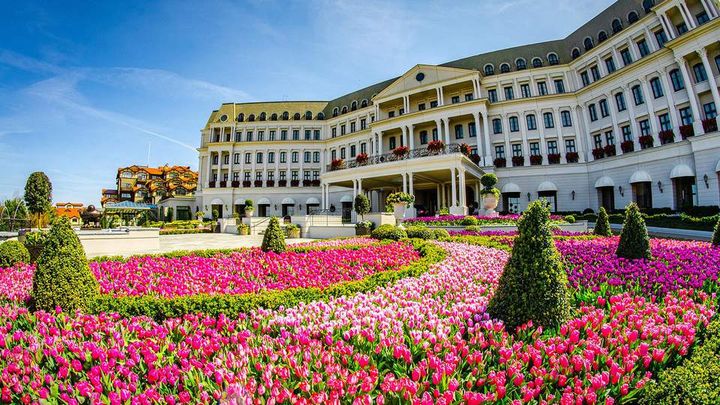Admit it—you need a vacation.
In between working at home and watching the news nowadays, who wouldn’t want to take a break from it all and head to the beach?
As the end of summer is fast approaching, many of us are probably dreaming of our next visit to a fancy hotel or resort.
With the onset of the “new normal” however, you can be sure that your next out-of-town trip will be particularly different from the ones you took before.
As we slowly emerge from the confines of quarantine, rest assured that your dream staycation is still possible. Keep in mind, however, that certain changes in the hospitality sector will be implemented to ensure your safety and security.
Read on to discover how your next vacation will be transformed under the standards of the “new normal.”
SINGLE OR DOUBLE ROOM?
Last May 22, Tourism Secretary Bernadette Romulo-Puyat issued the “New Normal Health and Safety Guidelines for Accommodation Establishments” (Memorandum Circular 2020-002). This set of guidelines are meant to direct members of the hospitality industry on how to go about their services in this era of pandemic. The memorandum covers guest handling, housekeeping, food and beverage (F&B) service, and other essential parts of the business.
This document encourages contact-free transactions and hygienic precautions. Upon checking in a hotel, for example, guests will be required to enter through a sanitizing mat and undergo a temperature check.
Hotel staff will no longer be required to escort guests to their rooms unless social distancing will be strictly enforced.
Each guest should receive a medical kit and protective personal equipment (PPE) from the reception upon check-in. The PPE should include disinfectant wipes, face masks, waste bags, alcohol sanitizers, tissue papers and disposable gloves.
In terms of service, minibar and complimentary food items in the room are discouraged except for bottled water. Most public recreational facilities, such as gyms and swimming pools, will be allowed to operate but will have to prescribe to restrictive health standards.
To ensure healthy physical distances will be followed, only single and double rooms will be allowed for use by guests.
Family members from the same household can avail themselves of a single room provided that they follow safety protocols.

Communal dining facilities remain closed in many hotels, with most meals consumed in guest rooms instead.
EMPHASIS ON STAYCATION
While you can already imagine your next vacation after the pandemic, it might be a while before your daydreams come into fruition. Hotels right now are not allowed to accept tourists on a leisure trip. Once they do, however, you can be sure to expect some drastic changes.
Peter Maxwell, Business Editor of the design magazine Frame, anticipates the rise of “the solo economy” and the shift towards personalized service.
With backpacker hotels and single-seater restaurants as prototypes, hospitality venues will transform to accommodate low-interaction activities. Solo travel and backpacking will probably become more popular than ever, with people focusing more on the offerings of their hotel rooms rather than its amenities.
Staying at a hotel will also become more experience-centered.
According to Keith Wilcox, an associate professor of marketing at Columbia University, there will be less focus on ‘Instagrammable moments’ and more on experiences tailored specifically to customers’ needs.
This means that more hotels will become more service-oriented, as they alter procedures to meet safety standards and hygienic regulations. Aesthetics will most likely take a backseat in hotel design, with function and comfort taking precedence in the “new normal.”
MODELS OF ISOLATION
Hotels around the world are modifying their offerings to adapt to the times. Luxury hotels, in particular, have turned exclusivity into their best asset.
The Nemacolin Woodlands Resort in Pennsylvania is one such example, as it opened its premises of 2,000 acres to just 40 guests last May.
The Nemacolin promises personal pampering with its new packages, turning social distancing into a luxurious experience.
Upon arriving at the resort, guests will receive a PPE package with sanitized snacks and drinks. While the hotel offers several public amenities, use of these areas will be on a scheduled basis to accommodate one guest or group at a time. The onsite restaurant remains temporarily closed, so guests have a choice of taking their meals at their rooms or on a picnic blanket in the open fields.
The Yotel Singapore, meanwhile, shows how technology has become the hotelier’s best weapon against the pandemic.
While the micro-hotel chain has already offered automated services since 2017, it has recently introduced robots to deliver amenities to guests. These robots are capable of calling for an elevator, pressing the correct floor button, and delivering items to guest rooms. Such technology allows the hotel to minimize contact between guests and staff, all the while maintaining responsive service.
Public amenities in hotels are slowly being allowed to operate although social distancing must still be maintained.
SERVICE WITH A SMILE AND A FACEMASK
Under the “new normal,” the Department of Tourism in our country discourages handshakes in hotels to greet guests. Instead, hotel staff are encouraged to place their right hand on their own chests as an alternative—also known as the “Mabuhay” gesture among those in the tourism sector.
Staff can also smile at guests as an alternative, although this might prove difficult to do when wearing a face mask.
Despite the restrictions of this pandemic era, nothing can hamper the warmth and hospitality of Filipinos.
Though it may take a while before we return to the old ways of vacationing, we can still enjoy staying or working at hotels without compromising our safety. So go ahead, plan that vacation months ahead of time and rediscover hotel stays under the “new normal.”
Help the travel, tourism and hospitality sectors regain their foothold in the economy, all while enjoying some luxurious pampering.
Sources: frameweb.com, architecturaldigest.com, businessmirror.com.ph, tourism.gov.ph, yotel.com, nemacolin.com, Thorsten Technoman via pexels.com


